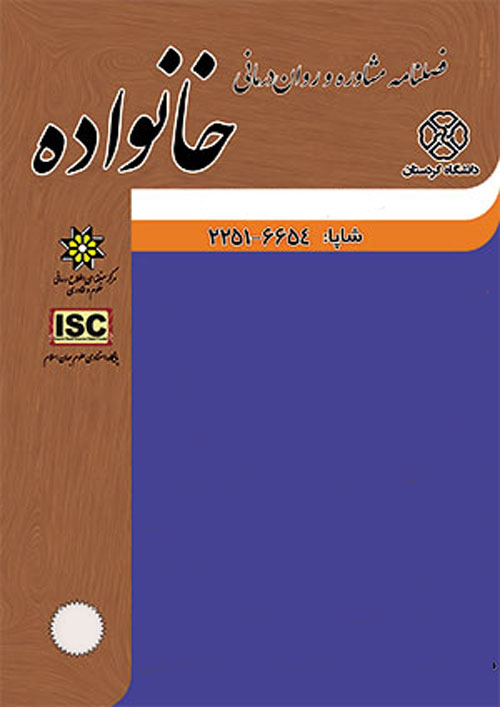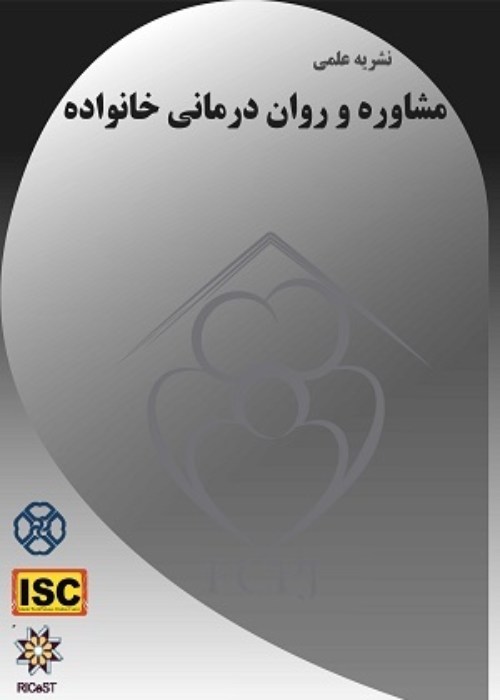فهرست مطالب

نشریه مشاوره و روان درمانی خانواده
سال پنجم شماره 3 (پیاپی 19، پاییز 1394)
- تاریخ انتشار: 1394/09/23
- تعداد عناوین: 7
-
- مقاله پژوهشی
-
صفحات 1-21هدف پژوهش حاضر اثربخشی زوج درمانی سیستمی- سازه گرا بر رابطه متقابل زناشویی در همسرهای آشفته بود. از میان همسرهای مراجعه کننده به مراکز مشاوره خصوصی و دولتی شهر اهواز با به کارگیری از ملاک های ورود و خروج و نقطه برش 101 در پرسشنامه سازگاری زوجی اسپانیر چهار زوج به روش نمونه گیری هدفمند- داوطلب انتخاب شدند. پژوهش حاضر آزمایشی تک موردی از نوع خط پایه چندگانه ناهم زمان است. شرکت کننده ها در مراحل خط پایه، درمان و پیگیری در چند نوبت پرسشنامه رابطه متقابل را تکمیل کردند. داده ها با به کارگیری روش های تحلیل دیداری (رسم نمودار)، شاخص تغییر پایا، فرمول درصد بهبودی (درصد افزایش) و مقایسه هنجاری تحلیل شدند. یافته ها نشان داد که همسرها در مرحله درمان (22/29%) و پیگیری (62/30%) بهبود را در رابطه متقابل نشان دادند. همچنین تحلیل مقایسه هنجاری نشان داد که همسرهای شرکت کننده پس از درمان از همسرهای بهنجار قابل تمایز نیستند. بر اساس یافته پژوهش زوج درمانی سیستمی- سازه گرا می تواند رابطه متقابل را در همسرهای مراجعه کننده به مراکز مشاوره افزایش و آشفتگی آن ها را کاهش دهد.کلیدواژگان: رابطه متقابل زناشویی، زوج درمانی سیستمی، سازه گرا، همسرهای آشفته
-
صفحات 22-49پژوهش حاضر با هدف بررسی نقش واسطه ای تاب آوری در رابطه میان انسجام و انعطاف پذیری خانواده با سلامت روانی دانشجویان در قالب یک مدل علی انجام گرفت. جامعه آماری این پژوهش شامل کلیه دانشجویان دوره کارشناسی ارشد دانشگاه آزاد اسلامی واحد علوم و تحقیقات کرمانشاه در سال تحصیلی 93-1392 بود که از میان آن ها تعداد 303 نفر (150 دختر و 153 پسر) با روش نمونه گیری تصادفی خوشه ایچندمرحله ای به عنوان گروه نمونه انتخاب شدند. برای اندازه گیری متغیرهای پژوهش، از مقیاس های انسجام خانواده سامانی، انعطاف پذیری خانواده شاکری، تاب آوری کانر و دیویدسون (CD-RISC) و سلامت عمومی گلدبرگ و هیلیر (GHQ-28) استفاده شد. مدل فرضی پژوهش از طریق مدل یابی معادلات ساختاری (SEM) با استفاده از رگرسیون چندگانه به شیوه متوالی هم زمان با بهره گیری از مراحل پیشنهادی بارون و کنی (1986) مورد تحلیل قرار گرفت. نتایج برآمده از تحلیل مسیر بیانگر معنی داری نقش واسطه ای تاب آوری در رابطه میان انسجام و انعطاف پذیری خانواده و سلامت روانی دانشجویان بود. هم چنین شاخص های نیکویی برازش GFI، AGFI، RFI و RMSEA حاکی از برازندگی مطلوب مدل پیشنهادی و تطابق آن با داده های تجربی بود. بر اساس یافته های پژوهش می توان نتیجه گرفت که کارکرد مطلوب خانواده از حیث انسجام و انعطاف پذیری، هم به صورت مستقیم و هم از طریق تقویت تاب آوری در فرزندان، می تواند نقش بسزایی در ارتقای سطح سلامت روانی اعضای خانواده داشته باشد.کلیدواژگان: انسجام خانواده، انعطاف پذیری خانواده، تاب آوری، سلامت روانی
-
صفحات 50-71رضایت زناشویی،خود کارآمدی و خوش بینی نقش برجسته ای در تجربه رضایت زندگی دارد. هدف پژوهش حاضر بررسی نقش واسطه ای خود کارآمدی و خوش بینی در رابطه میان رضایت زناشویی و رضایت از زندگی آموزگاران زن شهرستان نهاوند است. روش پژوهش از نوع تحلیل مسیر است. جامعه آماری را همه آموزگاران زن متاهل شهرستان نهاوند که دربرگیرنده 612 نفر بودند و در سال تحصیلی 94- 93 مشغول به تدریس بودند، تشکیل می دهد. اندازه نمونه پژوهش بر پایه به کارگیری جدول مرگان 240 نفر بوده است. روش نمونه گیری، خوشه ایچندمرحله ای است. گردآوری داده ها با به کارگیری ابزارهای رضایت از زندگی، رضایت مندی زناشویی هادسون، خود کارآمدی عمومی شوارتزر و خوش بینی انجام شده است. تحلیل داده ها با استفاده از نرم افزار SPSS انجام گرفت. اطلاعات به دست آمده از طریق رگرسیون، همبستگی پیرسان و تحلیل مسیر مورد تجزیه وتحلیل قرار گرفتند.نتایج همبستگی پیرسان نشان داد که میان همه متغیرهای پژوهش همبستگی معنی داری (05/0> P) وجود دارد. نتایج رگرسیون گام به گام روشنگر آن بود که دو متغیر خود کارآمدی و خوش بینی در رابطه میان رضایت زناشویی با رضایت از زندگی نقش واسطه ای دارند. نتایج تحلیل مسیر نیز برای اثر مستقیم رضایت زناشویی بر رضایت از زندگی برابر با 221/0 برآورد شد. بررسی اثر غیرمستقیم رضایت زناشویی بر رضایت از زندگی از طریق نقش واسطه ای دو متغیر خود کارآمدی و خوش بینی نیز رویهمرفته 287/0 برآورد شد که سهم خود کارآمدی در این اثر 17/0 و سهم خوش بینی 11/0 است. با توجه به یافته های پژوهش حاضر، روانشناسان و مشاوران خانواده می توانند با آموزش خوش بینی و خود کارآمدی و بالا بردن آن ها در زوجین، منجر به افزایش رضایت زندگی و رضایت زناشویی آنان شوند. همچنین بالا بردن رضایت زناشویی در بالا بردن رضایت از زندگی زوجین نیز کارساز است.کلیدواژگان: رضایت زناشویی، خود کارآمدی، خوش بینی، رضایت از زندگی
-
صفحات 72-92پژوهش با هدف شناسایی شیوه های پاسخ دهی همسران پس از افشای خیانت زناشویی انجام شد. روش پژوهش کیفی و از نوع نظریه مبنایی است. جامعه پژوهش دربرگیرنده همسرهای ساکن شهر تهران است که در زندگی زناشویی آن ها خیانت اتفاق افتاده و از هنگام افشای آن دست کم 1 سال و دست بالا 6 سال گذشته باشد و اینک با هم زندگی می کنند. نمونه دربرگیرنده 21 همسر آسیب دیده و پیمان شکن بود که به شیوه هدفمند و نظری انتخاب شدند. برای گردآوری داده ها از مصاحبه نیمه ساختاریافته و به منظور تحلیل داده ها از کدگذاری باز، محوری و انتخابی استفاده شد. دو چکیده اصلی و ده خرده چکیده از واکنش های همسران پس از افشای خیانت شناسایی شد. تحلیل داده ها نشان داد همسران پس از افشای خیانت از دو راهبرد فردی و تعاملی استفاده می کنند. راهبردهای فردی دربرگیرنده مدیریت هیجانات منفی و بهره گیری از معنویات و راهبردهای تعاملی دربرگیرنده رقابت، اجتناب، توافق و مشارکت است. این یافته ها به درک بهتر متخصصین مشاوره و درمان رابطه زوج از راهبردهایی که همسران در ازای افشای خیانت در پیش می گیرند، کمک می کند تا بتوانند مداخلات درمانی هماهنگ با وضعیت زوجین را تدوین کنند. به ویژه در مراحل نخستین درمان خیانت همسران را به سوی مدیریت هیجانات منفی و راهبردهای مشارکتی که برای طرفین سودمند است، سوق دهند.
این مقاله برگرفته از پایان نامه دکترای با عنوان «ارائه الگوی درمانی مبتنی بر تجارب روان شناختی زوج های دارای تجربه خیانت زناشویی و آزمون اثر بخشی آن در کاهش آسیب های ناشی از خیانت» می باشد.کلیدواژگان: خیانت زناشویی، راهبردهای فردی، راهبردهای تعاملی، نظریه مبنایی
-
Pages 1-21The aim of this research was to investigate the effect of systemic-constructivist couple therapy on mutuality in distressed couples. The method of sampling was purposive-voluntary, then among couples referring to private and governmental clinics in Ahwaz, 4 couples were selected using include and exclude criteria, and the cut of point in the Spanier dyadic adjustment questionnaire. The study was a Single‐Case Experimental method called non-concurrent multiple baseline design. Then, in several times, couples filled out mutuality questionnaire in treatment and following stages. The data were analyzed using visual analysis, reliable change index, percent improvement formula, and normative comparison. The results showed that the couples experienced improvement in mutuality in treatment (29.22%) and follow-up (30/62%) stages. In addition, normative comparison showed that there was not any different between treatment group and normal group. The systemic-constructivist couple therapy could increase mutuality and decrease distress in the couples referring to clinics.Keywords: mutuality, systemic, constructivist couple therapy, distressed couples
-
Pages 22-49Present study was carried with the aim of examine the mediating role of resilience in the relationship between family cohesion and flexibility with mental health of college students in the form of a causal model. The statistical populations in this study were all graduate students in Science and Research Branch, Kermanshah Islamic Azad University in 2014, which were selected 303 patients (150 female and 153 male) the multistage cluster random sampling method for the sample group. To measure the research variables, used measures of Samani's family cohesion, Shakeri's family flexibility, Conner and Davidson's Resilience Scale (CD-RISC), and Goldberg & Hillier's General Health Questionnaire (GHQ-28). The hypothetical model tested through Structural Equation Modeling (SEM) by sequential simultaneous regression analyses, with the use of the steps suggested by Baron and Kenny (1986). Results of path analysis, represents meaningful mediating role of resilience in the relationship between family cohesion and flexibility and mental health of students. In addition, the goodness of fit indices GFI, AGFI, RFI, and RMSEA indicated good fitness model and its correspondence with the experimental data. Based on the findings of this research it can concluded that proper functioning of the family in terms of cohesion and flexibility, both directly and by strengthening resilience in children can have a significant role in promoting psychological health level family members.Keywords: family cohesion, family flexibility, Resilience, mental health
-
Pages 50-71Marital satisfaction, self-efficacy, and optimism play an important role on life satisfaction. Therefore, present study aimed to investigate the mediating role of self-efficacy and optimism in the relation between marital satisfaction and life satisfaction among female teachers in Nahavand.This research study has done through the path analysis. The statistical population of this study included all female teachers in Nahavand city, 612 married women, who were all active teachers in the 93-94 academic years. The sample size in the study, based on the population size and according to Morgan table, was 240. Sampling method in this study was multistage cluster. The collected data used Life Satisfaction Questionnaire (TSWLS), Hudsons marital satisfaction questionnaire (IMS), Schwartzbergs general self-efficacy questionnaire (GSE) and optimism questionnaire (R -LOT). The Data analyzed by statistical softwares: SPSS and Amos. The Obtained information through the statistical methods of regression, Pearsons correlation, and path analysis analyzed. The results from Pearson correlation showed that there are significant correlations between all variables. The regression results also showed that two variables of self- efficacy and optimism in the relation between marital satisfaction and life satisfaction play a mediating role. A path analysis results as well, for direct effect of marital satisfaction on life satisfaction, was equal to 0/221. Examining the indirect effect of marital satisfaction on life satisfaction through the mediating role of the two variables, self-efficacy and optimism, was estimated 0/287, of which self-efficacy in this work has a0/17 share and optimism 0/11. Marital satisfaction variable has the ability to direct predictive teachers life satisfaction. In addition, the two variables, self-efficacy, and optimism, indirectly play a mediating role, between the two variables of marital satisfaction and life satisfaction for the teachers.Keywords: marital satisfaction, self, efficacy, optimism, life satisfaction
-
Pages 72-92The aim of this study was to investigate the accountability styles of couples after disclosure of infidelity. The present study is qualitative, grounded theory was used to conduct.The research population included couples who were inhabitants of Tehran and still live together. They have experienced infidelity and the time of disclosure of infidelity was the minimum one-year and the maximum six years. Subjects were selected using purposive sampling method. Semi structured interviews were conducted with 21 couples; 14 injured partners and seven unfaithful partners. For analyzing data, open, axial, and selective coding processes used. Two main themes and ten sub themes of couple's accountability styles after infidelity achieved. Data analysis revealed couples use two kinds of strategies after disclosure of infidelity: Individual strategies and Interactive strategies. Individual strategies consist of management of negative emotion and benefit from spirituality; interactive strategies consist of conflict, avoidance, agreement, and collaboration. The result can help counsellors and couple therapists to understand the couple's strategies after disclosure of infidelity to plan therapeutic interventions. Specially, the therapists in the first steps of therapy for couple's infidelity can benefit from management of negative emotion and collaborative strategies.Keywords: marital infidelity, individual strategies, interactive strategies, grounded theory


